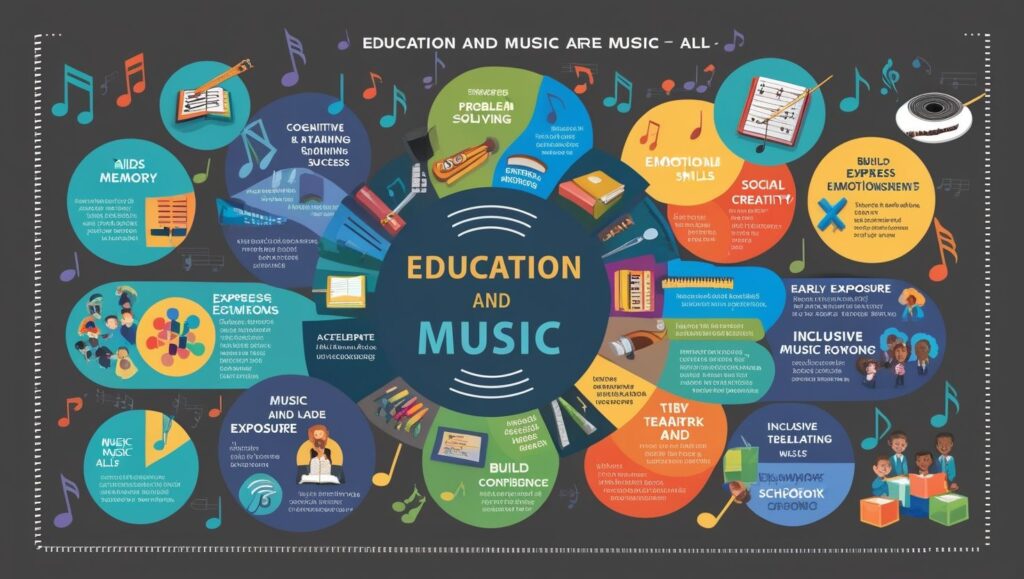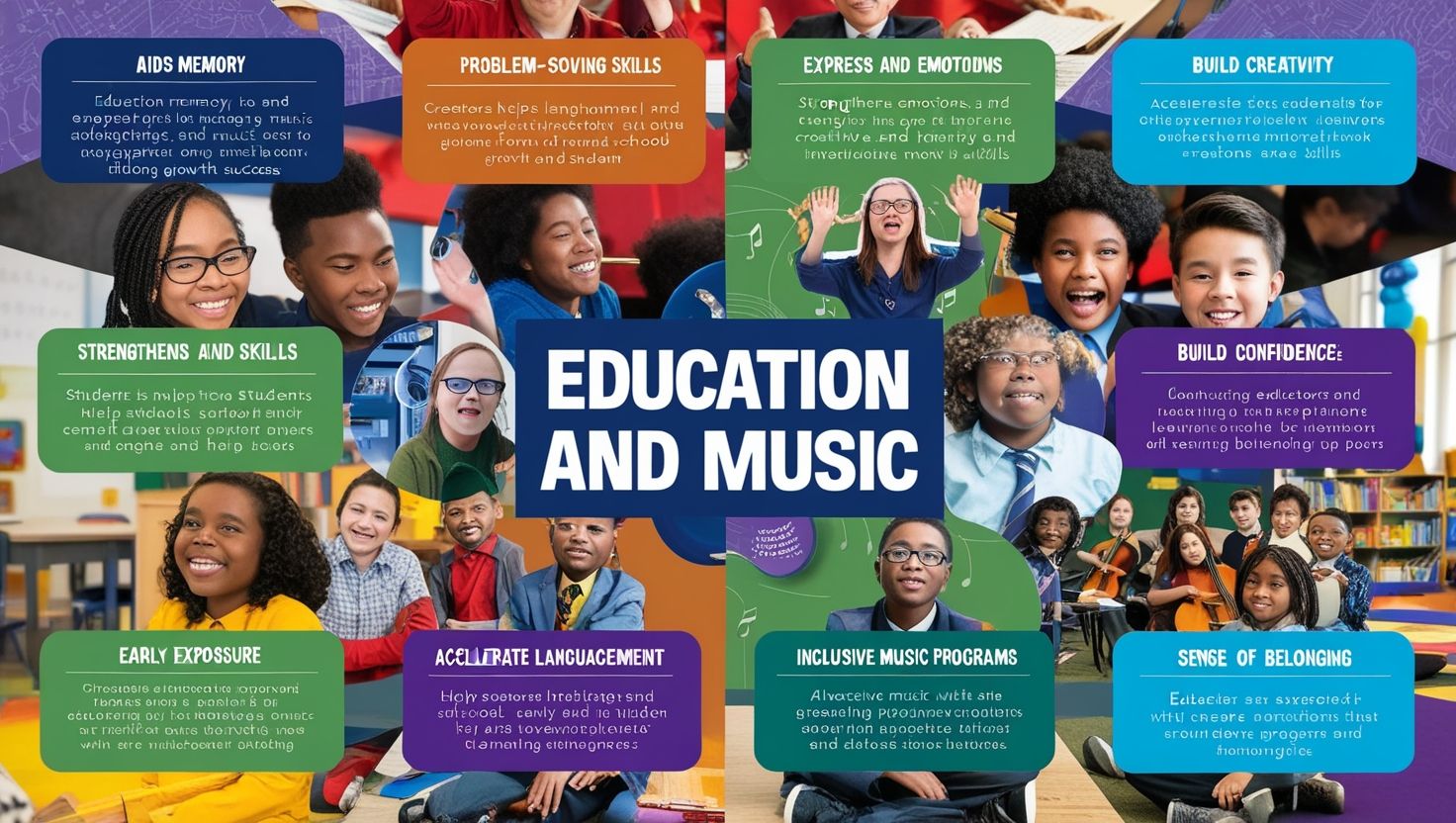Introduction
Education and Music, Music is often seen as a form of entertainment, but its educational impact is significant and profound. Numerous studies reveal that incorporating music into education not only enriches the learning environment but also enhances cognitive, emotional, and social development in students. This article explores the connection between education and music, highlighting its effects on academic performance, emotional well-being, and social skills.
1. Cognitive Benefits of Music in Education
One of the primary advantages of music in education is its cognitive benefits. Research shows that learning and listening to music can enhance brain functions in several ways, including memory, attention, and problem-solving skills. Music activates both the left and right hemispheres of the brain, which leads to improved brain function. When students engage in musical activities, they stimulate areas of the brain associated with language, reasoning, and spatial-temporal skills.
For example, students who learn to play instruments often demonstrate enhanced mathematical abilities. Playing music involves reading sheet music, understanding timing, and rhythm, which are related to mathematical principles. According to a study published in Educational Psychology, students with musical training had higher math scores than their peers without musical backgrounds. This link between music and mathematics is also rooted in the fact that music requires sequential learning, which is fundamental to solving math problems.
Moreover, musical education encourages neural plasticity—the brain’s ability to adapt and grow—which enhances learning potential across various academic subjects. Neuroscientific research indicates that musicians’ brains tend to have more robust connections between neurons, particularly in areas related to auditory processing and memory retention. Therefore, integrating music into educational settings could potentially lead to better academic performance by strengthening these neural connections.
2. Emotional and Psychological Benefits of Music Education
Music also plays a vital role in fostering emotional well-being. It offers an outlet for students to express themselves, manage stress, and build self-confidence. Emotions are intricately tied to learning experiences, and music education helps students tap into their feelings and improve emotional regulation.
For instance, music therapy, a therapeutic approach using music to address emotional and psychological needs, has shown success in educational settings. According to the Journal of Child Psychology and Psychiatry, music therapy can reduce symptoms of anxiety and depression in students, making it an effective tool in enhancing emotional resilience. Schools that incorporate music education often report fewer instances of stress-related disorders among students, as music provides a healthy channel for self-expression and emotional release.
Additionally, participating in musical performances or group music classes boosts self-confidence and provides a sense of accomplishment. Students who take part in music activities are often tasked with overcoming performance anxiety, which helps them build self-esteem. As they practice and improve, they become more confident in their abilities, which positively impacts other areas of their lives, including academic performance and social interactions.

3. Social and Collaborative Advantages of Music Education
Beyond cognitive and emotional benefits, music education fosters essential social skills. Music, by its nature, is a collaborative endeavor. When students play instruments or sing in groups, they learn the importance of teamwork, communication, and empathy. These social skills are fundamental to personal and professional success, making music education a valuable addition to any curriculum.
Group music activities teach students to listen to others, synchronize with their peers, and work together toward a common goal. According to a study published in Psychology of Music, students involved in music programs reported higher levels of social bonding and empathy than those in non-musical activities. This study suggests that music education not only promotes teamwork but also fosters a sense of belonging among students.
Furthermore, music helps bridge cultural gaps. Diverse music selections expose students to various cultural backgrounds, fostering an understanding and appreciation of different traditions. By learning about and engaging with music from different cultures, students broaden their perspectives and develop a sense of global citizenship.
4. Enhancing Creativity and Innovation Through Music
Music education promotes creativity, an essential skill in the modern workforce. The creative process involved in composing, arranging, or improvising music allows students to think outside the box and approach problems from multiple angles. Creativity in music transfers to other areas, helping students develop innovative solutions in academic and personal settings.
Incorporating music into the curriculum encourages students to experiment, make mistakes, and learn from them—key components of the creative process. According to research from the Journal of Research in Music Education, students involved in creative musical activities show improved critical thinking and problem-solving abilities. They learn to interpret musical pieces uniquely, fostering a mindset that embraces innovation.
5. The Role of Music in Early Childhood Education
Early exposure to music education has profound effects on child development. Research has shown that children introduced to music at a young age have better motor skills, language development, and emotional awareness than their peers without musical exposure. Programs like “Music Together” or “Kindermusik” are designed to engage young children with music, teaching them fundamental skills through rhythm and melody.
Language development, in particular, is significantly impacted by music. Singing nursery rhymes, for instance, helps children develop phonemic awareness and vocabulary, setting the foundation for reading and language skills. Studies reveal that children who engage in musical activities show faster development in speech and reading skills than their non-musical counterparts.
6. Music as a Tool for Inclusivity in Education
Music is a universal language that can break down barriers, making it an excellent tool for fostering inclusivity in educational settings. Music classes often include students from diverse backgrounds, including those with important needs. Music therapy has shown promise in helping students with disabilities, including autism and ADHD, by improving their social and communication skills.
Schools that offer inclusive music programs create environments where all students, regardless of their abilities, can participate and thrive. According to a report in Frontiers in Psychology, as it provides a non-verbal means of expression and promotes social engagement.
In addition, bilingual or multilingual students can benefit from music classes that incorporate songs in different languages, helping them feel more connected to their peers and the school community. By fostering a sense of belonging and inclusivity, music education enriches the learning environment for all students.
7. Practical Approaches to Integrate Music into Education
Integrating music into the educational system requires strategic planning and support from educators and administrators. Some practical approaches include incorporating music-related activities in non-music subjects, offering extracurricular music programs, and ensuring access to quality music education for all students.
Educators can use songs to reinforce concepts in subjects like history, language arts, and science. For instance, using songs to teach historical events or literary themes helps students retain information more effectively. Extracurricular programs, such as school bands, orchestras, and choirs, provide students with additional opportunities to engage in music.
However, funding and accessibility can pose challenges. Many schools face budget constraints that limit their ability to offer music programs. Ensuring that every student has access to music education may require creative solutions, such as partnerships with community organizations or virtual music classes.
8. Conclusion
The integration of music into education offers a myriad of benefits, from enhancing cognitive abilities to fostering emotional well-being and social skills. Music education not only prepares students for academic success but also equips them with essential life skills such as creativity, empathy, and resilience. By investing in music education and ensuring its accessibility, educators can create a more holistic learning environment that supports students’ development on multiple levels. Ultimately, music and education are intricately linked, and together they provide students with a well-rounded foundation for lifelong success.
References
- Educational Psychology – Study on the cognitive benefits of music in relation to mathematics.
- Journal of Child Psychology and Psychiatry – Research on music therapy and its effects on emotional resilience in children.
- Journal of Research in Music Education – Analysis of creativity and critical thinking development through music education.

14 thoughts on “Education and Music”
Comments are closed.